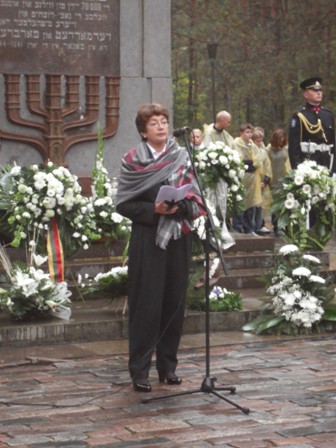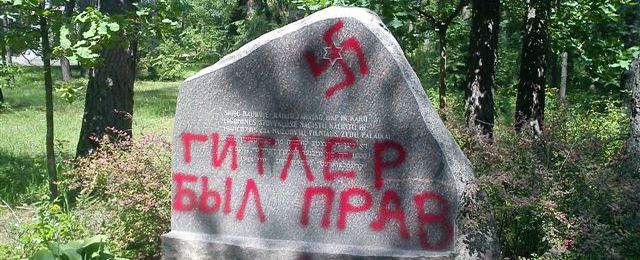This year’s commemoration ceremony at Ponar (Paneriai) was held today, attended by government officials, the diplomatic corps, and a sizable crowd of mostly Jewish participants. Ponar is the mass grave site near Vilnius where 100,000 civilians ― around 70,000 of them Jews of Vilna and its environs ― were murdered by Nazi henchmen between 1941 and 1944. In 2005, Yale University Press brought out Kazimierz Sakowicz’s eyewitness account, Ponary Diary, where it is reconfirmed that most of the killing was done by volunteer local killers.
of Vilna and its environs ― were murdered by Nazi henchmen between 1941 and 1944. In 2005, Yale University Press brought out Kazimierz Sakowicz’s eyewitness account, Ponary Diary, where it is reconfirmed that most of the killing was done by volunteer local killers.
The country’s small but vibrant Jewish community was proudly represented by Faina Kukliansky, head of the Vilnius Jewish Community and vice chairman of the Jewish Community of Lithuania. In her speech (English translation here), Kukliansky, one of the country’s foremost attorneys, did not mince words. She explained that whatever differences of opinion may exist, the community was unanimous in condemning the Double Genocide movement, as well as projects to equate Nazi and Soviet crimes whose purpose is to trivialize or mitigate the Holocaust specifically and the notion genocide more generally. Moreover, she stressed the need to expose the identities of all the local killers who carried out the genocide of Lithuanian Jewry. She also mentioned that it was only the Jewish Community of Lithuania, not the Lithuanian or Israeli government, that established a fund to help each and every Holocaust era Lithuanian rescuer live a better life to the end of his or her days.
Fania Yocheles Brantsovsky, a Vilna Ghetto survivor and hero of the anti-Nazi partisan resistance in the forests of Lithuania, delivered her own eloquent address in Yiddish, declaring that the victims would never be forgotten, neither by Jewish people nor by humankind.


